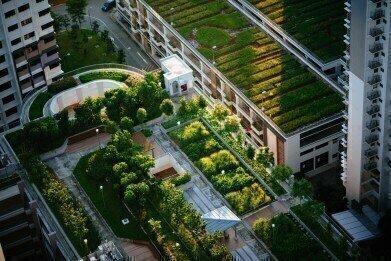Environmental Laboratory
How Do Green Roofs Help the Environment?
Oct 09 2015
Green roofs – or the installation of plant life on the roof of buildings – is becoming an increasingly popular practice across the globe, especially in North America and Europe. This is due to an incredible number of benefits which the flora atop one’s roof can lend not only to the inhabitants of the building, but to the wider community and to the atmosphere in general.
Here is a rundown of a handful of the more prominent advantages which green roofs bring to the environment and to us as a species.
Aesthetic Enhancement
There’s no denying that a rooftop overflowing with vegetation looks easy on the eye. This can help to make dense, concrete cities look more appealing and invite investment from outside sources. It can also provide a clean, attractive space for building residents to gather and interact, and could even serve as a location for a commercial opportunity.
Waste Disposal and Water Recycling
Traditionally, buildings have been built to shed rain, using impenetrable roofs which cause the precipitation to run off onto the ground. While this serves to keep the building and its inhabitants dry, it does very little to mitigate the risk of flooding in heavy rains – extensive run-off can pick up bacteria from animal waste and harmful pesticides, which then filters into local water supplies and bodies. With plant life sucking up the rainwater, run-off is reduced. Excess water can even be used to flush toilets and irrigate other plants around the building.
Forestation
“The roofscapes of our cities are the last urban frontier—from 15% to 35% of the total land area—and the green roof industry can turn these wasted spaces into a force for cleaner air, cleaner water, energy savings, cooling, beauty and recreation,” says Steven Peck of Green Roofs for Healthy Cities, an initiative based in Canada. By utilising this neglected area of our urban landscapes, we can reduce the debilitating effects of deforestation, lessen the amount of carbon dioxide in the air and even combat climate change.
Air Quality Clean Up
The air we breathe in and around the buildings in which we live and work is becoming an increasingly prevalent area of concern. With pollution a hot topic, having more plant life to suck up harmful contaminants and filter out noxious gases can only be a good thing. Furthermore, they can also inhibit the distribution of particulate matter (PM2.5) and dust, which cause health problems for those who inhale them.
Energy Efficiency
Because of a plant’s natural dew and evaporation cycle which takes place on a daily basis, they are capable of regulating the temperature of their surroundings. As such, they can combat the Urban Heat Island effect which dictates that temperatures in some cities are as much as 10°C higher than in less built-up areas. This is strengthened by the fact that the plants cover black roofs (which absorb heat) and convert the sunlight into energy through photosynthesis – without them, this sunlight would simply become heat energy. This can even translate into saving money on energy bills for homeowners, who would have to use less AC in the summer and less heating in the winter.
Increased Biodiversity
Having green spaces in urban environments increases the potential habitats for a variety of birds, insects and other small animals, leading to a more harmonious atmosphere. This also enables these environments to sustain natural disasters (such as famines, droughts or other major events) with more success than areas with less varied wildlife.
Digital Edition
IET 34.2 March 2024
April 2024
Gas Detection - Biogas batch fermentation system for laboratory use with automatic gas analysis in real time Water/Wastewater - Upcycling sensors for sustainable nature management - Prist...
View all digital editions
Events
Apr 22 2024 Hannover, Germany
Apr 22 2024 Marrakech, Morroco
Apr 23 2024 Kuala Lumpur, Malaysia
Apr 23 2024 Kintex, South Korea
Apr 23 2024 Edmonton, AB, Canada


















